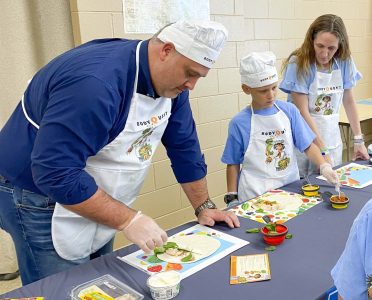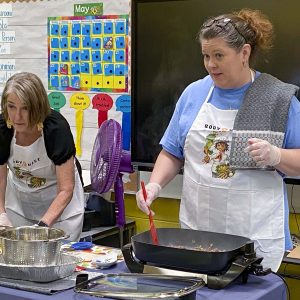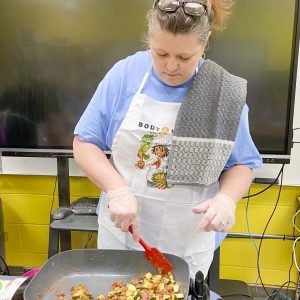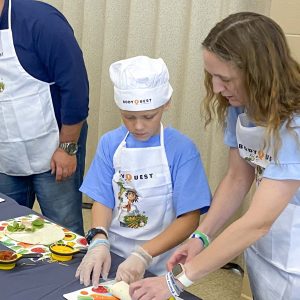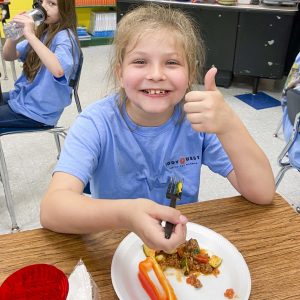Home & Family

AUBURN UNIVERSITY, Ala. – Third-grade students in Marion and Walker Counties put on their chefs’ hats for first-hand experience in preparing Live Well Alabama recipes before the Memorial Day weekend.
Ginger Eatman, SNAP-Ed educator in Marion and Walker Counties, hosted food demos for her Body Quest students in several schools to have the students make and taste the recipes discussed in the classroom. Body Quest is an innovative childhood obesity prevention initiative implemented by Alabama SNAP-Ed that empowers third graders and their parents to make healthier choices.
Eatman solicited help from principals, teachers and students to set up a cooking station at the school. Students were able to wear the Body Quest chef’s hat for their culinary adventure. The crew rolled up their sleeves and demonstrated a healthy a snack for their fellow classmates.
What’s Cooking
Eatman facilitated food demos for Live Well Alabama recipes such as the Turkey Spinach Wrap, Enchilada Rice and Easy Skillet Dinner. At times, Eatman said crowds of 60 students gathered for the demonstration with rave responses after the food was prepared. She said many students came back for second helpings and talked about how they would like to see the recipes added to their lunch schedules in the cafeteria.
Eatman said the idea stemmed from classroom experiences. During the Body Quest curriculum, she asks how often students make the recipes discussed in the classroom at home. After continually receiving a lukewarm response, Eatman felt she needed to do something to reinforce education in the classroom by creating a tasting experience for the students and teach them ways to consume more fruits and vegetables.
“I felt like if the students could be involved with the demos and actually make and taste the recipes, they may be more inclined to tell their parents they like certain foods and ask if they can make it for dinner,” Eatman said.
Hands-On Learning
This thought drove home the idea of getting the teachers and students to work together to create the recipes. Eatman works in part from the USDA’s MyPlate curriculum in the classroom, which recommends making half a plate of fruits and vegetables when eating a meal. Not only did Eatman attempt to drive home this fact by bringing Live Well Recipes to life, but she also created a fun, engaging and hands-on learning experience for students.
“If kids make it, they are more apt to eat it,” Eatman said. “If they grow it, they are more apt to eat it.”
Working Toward Change
Eatman said she’s working with school administrators to implement a few Live Well Recipes into school lunches in Marion and Walker Counties. She said access to fruits and vegetables would improve their quality of life and strengthen the education received in the classroom.
“After Body Quest, what are we doing to continue to reinforce if the parents or grandparents don’t buy those fruits and vegetables or if they aren’t getting it on the school lunch menu?” Eatman said. “Where do we go from there?”
More Information
To contact Ginger Eatman, SNAP-Ed educator in Marion and Walker counties, call (205) 921-3551 or email her at gne0001@aces.edu.
To learn more about SNAP-Ed and the work of educators throughout Alabama, visit www.LiveWellAlabama.com or visit them on Facebook, Instagram, Twitter, and Pinterest.

